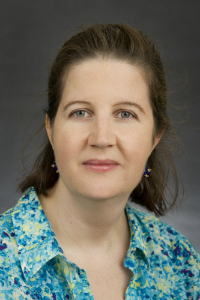
Dr. Caryn Evilia
Full Professor
Office: PSC 356, Pocatello
208-282-4373
Ph.D. Biological Chemistry, University of Pennsylvania, 1998
Research area: Biochemistry, Structural Biology, Microbiology, Metagenomics
Student experience required for research: BIOL 1101, 1102, enrolled in 2235/2221; CHEM 1111, 1112, enrolled in CHEM 3301, 3302
Student experience gained from research: Enzyme assays with traditional and non-traditional enzymes, molecular biology, biochemistry and microbiological methods, structural biology instrumentation, bioinformatics, and computer model building.
Ideal preparation for: Professional schools- especially Graduate and Medical school, and the Biotechnology and Pharmacology industries.
Research Focus
My research program focuses on the effects of extreme conditions on microbes, proteins and nucleic acids. In particular, my lab studies the structural adaptations in proteins and the genome, that microbes need to have to survive under these conditions. My lab studies these adaptations through a combination of experimental and computational biochemistry and microbiology, structural biology, and bioinformatics.
Proteins and nucleic acids are very sensitive to their chemical and physical surroundings. Like the organisms from which they are isolated, these molecules tend to function and remain stable over a relatively narrow range of environmental conditions such as temperature, pH, salinity, and pressure.
What those narrow conditions are, however, can vary widely. Most organisms grow best at about 37 oC, under one atmosphere of pressure, with less than 0.1 M salt. But many extremophile microbes do not; some grow in hot springs where the temperatures range from 40 oC to ~100 oC, or in hypersaline environments, such as the Great Salt Lake, where the salinity is over saturation at +250 grams/L total salts. These organisms must have evolved adaptations to maintain the structural integrity of their proteins, nucleic acids, and membranes under these conditions, because non-extremophile proteins rapidly denature and/or lose activity when subjected to them. My lab focuses on adaptations for the extreme halophiles and related organisms, to determine how they survive and thrive in their extreme environment.
Recent Publications
Brininger, C., Spradlin, S., Lori, C., Evilia, C. 2018. “The more adaptive to change, the more likely you are to survive: Protein adaptation in extremophiles”. Seminars in Cell and Developmental Biology, 84, 158-169. DOI: 10.1016/j.semcdb.2017.12.016
Evilia, C. 2018. “Understanding protein adaptations can help us solve real problems”. Seminars in Cell and Developmental Biology, 84, 127-128. DOI: 10.1016/j.semcdb.2018.02.009
S. Spradlin, L. Cobani, C. Brininger, C. Evilia, Book chapter, titled, “Archaea were trailblazers in signaling evolution: Protein adaptation and structural fluidity as a form of intracellular communication”, in Biocommunication in Archaea, Editor: Günther Witzany, Springer International Publishing AG, Cham publishers. DOI: 10.1007/978-3-319-65536-9_12
Hanson, R., Evilia, C., Gilmer, J., Woods, L., Black, B., Flores, R., Pfau, J. C. 2016. “Libby Amphibole-Induced Mesothelial Cell Autoantibodies Bind to Surface Plasminogen and Alter Collagen Matrix Remodeling.” Physiological Reports, 4 (15, e12881), 1-12. DOI: 10.14814/phy2.12881
C. J. Reed, Bushnell, S. C. Evilia. 2014. "Circular dichroism and fluorescence spectroscopy of cysteinyl-tRNA synthetase from Halobacterium salinarum ssp. NRC-1 demonstrates that group I cations are particularly effective in providing structure and stability to this halophilic protein." PLoS ONE, 9 (3), e89452. DOI: 10.1371/journal.pone.0089452. eCollection 2014
